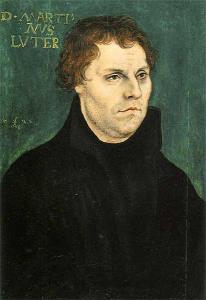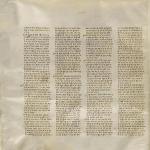[from my book, The “Catholic” Luther: An Ecumenical Collection of His “Traditional” Utterances (Dec. 2014, 166 pages) ]
One adopts this way, another that, and there grows up in each man a false, secret love for his own sect, and a hatred, or at least a contempt for, and a disregard of the other sects, whereby brotherly, free, common love perishes, and selfish love prevails. (A Treatise on the Holy Mass, Aug. 1520; tr. J. J. Schindel in 1915; in W1)
In the absence of any form or basis of a valid ministry, we see noble Bohemia transformed into a Babylonia described by Isaiah . . . What wonder, then, if in this confusion the people of Bohemia become nothing but schismatics, and no certain basis of faith or life exists . . . ? (Concerning the Ministry, Sep. 1523, tr. Conrad Bergendoff; in LW, v. 40)
Satan has founded another sect among us, who are neither acknowledged by the Papists nor by our own people. They boast that they are animated by celestial spirits, and are independent of the witness of the Spirit within them. (To Nicholas Gerbel, 6 May 1524; in LML)
Since he [Satan] now comes at us with false spirits and sects, we must take stock of our situation so as not to be led astray. . . . They come from heaven, and hear God himself speaking to them as angels. (Letter to the Princes of Saxony Concerning the Rebellious Spirit, July 1524, tr. Conrad Bergendoff; in LW, v. 40; the second part is heavy sarcasm)
[I]t is perilous when dissension, sects, and errors arise among Christians . . (Letter to the Christians at Strassburg in Opposition to the Fanatic Spirit, Dec. 1524, tr. Conrad Bergendoff; in LW, v. 40)
Thomas Munzer is meandering about, uncertain where to settle. He made a dangerous disturbance in Muhlhausen. The prophets are increasing steadily, a trial for true believers. The Papists rejoice over our differences, but God will expose Karlstadt in His own time. (To John Brismann, 11 Jan. 1525; in LML)
This quarrel among the sects is a sign that their teachings are of Satan, since the Spirit of God is not a spirit of discord, but of peace. (Letters II, ed. and tr. Gottfried G. Krodel; to Michael Stifel, 31 Dec. 1525; in LW, v. 49)
[T]his sacramentarian sect has already produced six heads in one year. A wonderful spirit, thus to disagree with itself! . . . All these diverse spirits condemn each other with crafty arguments, all boast of revelations which they obtained by prayers and tears, . . . Good for us, that Christ has made them fight each other from the very beginning. (Letters II, ed. and tr. Gottfried G. Krodel; to Georg Spalatin, 27 March 1526; in LW, v. 49)
I am also attacking the Sacramentarians. Pray Christ to guide my pen so as to refute Satan successfully. I am greatly rejoiced over your testimony that you are untainted by such rubbish. . . . I am grieved that that estimable man Oecolampadius has fallen into the mire through such childish nonsensical ideas. Satan urges him on. May God save him! Urbanus Rhegius also inclines the same way, or has fallen in. (To Nicolas Hausmann, 1 Jan. 1527; in LML)
[L]et every faithful Christian be warned against the enemies of the sacrament, for the reason that this sect from the very beginning has had so many factions and leaders who are at odds among themselves over this text, “This is my body given for you.” Such dissension and factionalism cannot and does not come from the Holy Spirit. It certainly comes from the very devil himself, . . . (Confession Concerning Christ’s Supper, Feb. 1528, tr. Robert H. Fischer; in LW, v. 37)
All the sectaries think they are a hundred times wiser than I, and do not listen to me; I am more at war with them than with the Pope, and they do more harm. (To William Pravest, 14 March 1528; in LL2)
I have received your Grace’s invitation to Marburg to the disputation with Oecolampadius and the other Swiss divines, to see if we cannot see eye to eye regarding the sacrament. Although I have little hope of this, still your Grace’s anxiety for unity and peace is most laudable, and I am willing to cooperate in such vain and for us perhaps dangerous efforts, for the other party must not have the glory of outstripping me (if God will) in the desire for unity. I beseech you to learn if they feel inclined to yield their opinions, to prevent the evil becoming worse. It seems as if they were trying, through your Grace’s zeal, afterwards to boast that they had moved great princes to interfere to prove that they wished peace while we were its enemies. (To Landgrave Philip of Hesse, 23 June 1529; in LML)
If, however, this diet shall break up without result (which may God graciously forbid!) and nothing worth while be accomplished, after all the world has for a long while been fed with false hopes and put off by diets and councils, and that hope has all been false and vain, it is to be feared that despair will be bred, and everyone will become overtired of false hopes and delays, and the long, fruitless waiting will produce impatience and make bad blood. For things cannot longer stay as they now are, especially with you and your class; you know and feel that better than I can tell you. I am therefore doing what now I do, for your own good and for the sake of peace and unity. . . . You know, too, the strong and firm stand that we have taken against all the fanatics. . . . The fanatics have always despised and persecuted my doctrine more than yours, and I have had to set myself against them more strongly and defend myself more harshly than I ever did against the pope . . . (An Exhortation to the Clergy Assembled at the Diet of Augsburg, May 1530; tr. C. M. Jacobs; in W4)
[S]ome will say here, – “Yes, it is all your fault; you began it, and these are the fruits of your teaching.” Ah, well! I must suffer that, knowing full well that I am accused of it; but, on the other hand, I know many godly people among you who know that it is not true. The work is there in broad daylight, and it is my strong witness. The fanatics have always despised and persecuted my doctrine more than yours, and I have had to set myself against them more strongly and defend myself more harshly than I ever did against the pope. How then, can it have come out of my teaching? Or why did not this disturbance arise among my followers, where I was preaching and teaching every day, and where the first and worst evil should have happened, if this kind of dissension was to come out of my doctrine? (Exhortation to the Clergy Assembled at the Diet of Augsburg, May 1530; tr. Charles M. Jacobs; in BC)
[T]he goods of the monasteries and the endowments are being seized, . . . It is a fact, – and it does not please me either, – that these goods are seized and scattered. The Unlutherans are doing most of it, and get more of the profits than those who are accused of being Lutherans, as can easily be proved. I am especially ill-pleased when knaves get hold of them, . . . (Ibid.)
Would that I could convince you of what I told you in Coburg, that I desire greatly to heal this rupture, even should it cost three lives, for unanimity is necessary for us, and our dissensions have injured the gospel, . . . (To Martin Bucer, 22 Jan. 1531; in LML)
Karlstadt has succeeded Zwingli in Zurich, whom they now declare to be one of Christ’s martyrs, that they may fill up the measure of their iniquities. (To Martin Gorlitz, 3 Jan. 1532; in LML)
We are now seeing God’s judgments for the second time — first on Munzer and now on Zwingli. I prophesied that God would not long suffer such blasphemies, calling us cannibals, blood-drinkers, and other horrible names. They have brought it upon themselves. (To Wenzel Link, 3 Jan. 1532; in LML)
I have received your letter, begging that I should take the doctrine of the sacrament into Christian consideration, so that an enduring concord might ensue between us and the Swiss. Now your Grace knows how anxious I have always been for unity, having been much tried by such dissension, knowing how injurious it is to Christ’s kingdom, and that the Pope would have been humbled long ago had your Grace managed to carry through the much-desired negotiations with Bucer and his friends. And even yet I am ready to concede all that I can with a clear conscience, but I fancy that even among the foreign (Swiss) preachers there are few who adhere to Bucer, and both parties will perhaps later decry both one and the other. (To Landgrave Philip of Hesse, 17 Oct. 1534; in LML)
[N]ew sects always rise up against me, . . . we are attacked by so many sects which constantly disagree with one another – sometimes they even originate within our own ranks – . . . (Letters III, ed. and tr. Gottfried G. Krodel; to James Propst, 15 Sep. 1538; in LW, v. 50)
SOURCES
BC Book of Concord (Triglot Concordia: The Symbolical Books of the Evangelical Lutheran Church: German-Latin-English (Published in 1917 by resolution of the Evangelical Lutheran Synod; St. Louis: Concordia Publishing House, 1921; translated by W. H. T. Dau and F. Bente.
LL2 Luther’s Correspondence and Other Contemporary Letters, Vol. II: 1521-1530; translated and edited by Preserved Smith and Charles M. Jacobs (Philadelphia: The Lutheran Publication Society: 1918).
LML The Letters of Martin Luther, selected and translated by Margaret A. Currie (London: Macmillan & Co., Ltd., 1908).
LW Luther’s Works, American edition, edited by Jaroslav Pelikan (volumes 1-30) and Helmut T. Lehmann (volumes 31-55), St. Louis: Concordia Publishing House (volumes 1-30); Philadelphia: Fortress Press (volumes 31-55), starting in 1955.
W1 Works of Martin Luther, Volume I (Philadelphia: A. J. Holman Co.: 1915).
W4 Works of Martin Luther, Volume IV (Philadelphia: A. J. Holman Co. and The Castle Press: 1931).
Related Reading
Martin Luther: “Our manner of life is as evil as is that of the papists” [12-29-07]
Did Luther Regret Anything About His “Reformation”? [5-13-08]
Unbridled Sectarianism, Sola Scriptura, Luther, & Calvin [6-24-09]
Luther on Early Lutherans: “Ingrates” Who Deserve God’s “Wrath” [2-28-10]
Luther’s Disgust Over Protestant Sectarianism and Radical Heresies [3-1-10; abridged and published in the National Catholic Register: 9-8-17]
Luther on Early Lutheran Degeneracy & Bad Witness [3-2-10]
Was Luther in His Old Age in Agony & Bitter About Lutheranism? [3-3-10]
Luther’s “Agony” Over Sectarianism (vs. a Lutheran) [3-10-10]
Luther: Monks & Priests More “Earnest” Than Lutherans [11-10-11]
Martin Luther as Initial Cause of Protestant In-Fighting [10-13-17]
***
Practical Matters: Perhaps some of my 4,000+ free online articles (the most comprehensive “one-stop” Catholic apologetics site) or fifty books have helped you (by God’s grace) to decide to become Catholic or to return to the Church, or better understand some doctrines and why we believe them.
Or you may believe my work is worthy to support for the purpose of apologetics and evangelism in general. If so, please seriously consider a much-needed financial contribution. I’m always in need of more funds: especially monthly support. “The laborer is worthy of his wages” (1 Tim 5:18, NKJV). 1 December 2021 was my 20th anniversary as a full-time Catholic apologist, and February 2022 marked the 25th anniversary of my blog.
PayPal donations are the easiest: just send to my email address: [email protected]. You’ll see the term “Catholic Used Book Service”, which is my old side-business. To learn about the different methods of contributing, including 100% tax deduction, etc., see my page: About Catholic Apologist Dave Armstrong / Donation Information. Thanks a million from the bottom of my heart!
***
Photo credit: Martin Luther, 31 December 1525 (age 42), by Lucas Cranach the Elder [public domain / Wikimedia Commons]
Summary: Citations from Martin Luther on sectarianism and fanaticism, proving that he generally opposed them, but rejected the notion that his ideas caused schism to occur.














